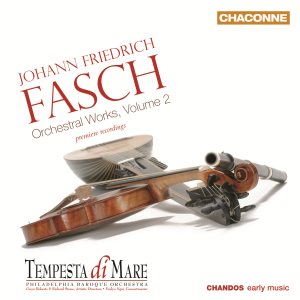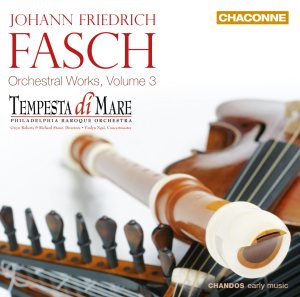 |
 |
| 

alternatively
CD: MDT
AmazonUK
AmazonUS
Download
from The Classical Shop |
Johann Friedrich FASCH
(1688 - 1758)
Orchestral Works - Volume 2
Concerto for 2 flutes, 2 oboes, 2 bassoons, 2 horns, strings and
bc in D (FWV L,D5) [19:10]
Overture for 2 flutes, 2 oboes, bassoon, strings and bc in a minor
(FWV K,a1) [25:51]
Sinfonia for strings and bc in g minor (FWV M,g1) [10:10]
Concerto grosso for 2 flutes, 2 oboes, bassoon, strings and bc in
G (FWV L,G13) [18:37]
 Tempesta di Mare, Philadelphia Baroque Orchestra/Gwyn Roberts, Richard
Stone
Tempesta di Mare, Philadelphia Baroque Orchestra/Gwyn Roberts, Richard
Stone
rec. live, October 2010, March; May 2011, Presbyterian Church of
Chestnut Hill, Philadelphia, PA, USA. DDD
 CHANDOS CHAN 0783 [74:12]
CHANDOS CHAN 0783 [74:12]
|


alternatively
CD: MDT
AmazonUK
AmazonUS
Download
from The Classical Shop |
Johann Friedrich FASCH
(1688 - 1758)
Orchestral Works - Volume 3
Overture for 3 trumpets, timpani, 2 horns, 2 oboes, bassoon, strings
and bc in D (FWV K,D2) [8:13]
Concerto for recorder, strings and bc in F (FWV L,F deest) [8:09]
Concerto for violin, 2 flutes, 2 oboes, strings and bc in D (FWV L,D8)[10:00]
Overture for 2 horns, 2 flutes, 2 oboes, 2 bassoons, strings and bc
in F (FWV K,F1) [20:28]
Concerto for lute, strings and bc in d minor (FWV L,d1) [15:20]
Konzertsatz in F (FWV L,F3) (allegro) [3:24]
 Tempesta
di Mare, Philadelphia Baroque Orchestra/Gwyn Roberts, Richard Stone Tempesta
di Mare, Philadelphia Baroque Orchestra/Gwyn Roberts, Richard Stone
rec. live, October 2010, October ; December 2011; March 2012, Presbyterian
Church of Chestnut Hill, Philadelphia, PA, USA. DDD
 CHANDOS CHAN 0791 [66:20]
CHANDOS CHAN 0791 [66:20] |
| |
Johann Friedrich Fasch is one of the leading composers of the
German baroque. For a long time his music has been overlooked,
but in recent years it has been enjoying a revival. Especially
in the last decade or so several discs have appeared which are
devoted to his instrumental music.
Most of his oeuvre dates from his time as Kapellmeister
at the court of Anhalt-Zerbst from 1722 until his death. Fasch
wasn't just a prolific composer, he was also an avid collector
of music. This resulted in a large collection of music which
he could perform with the musicians of his chapel. Parts of
this collection were purchased, but Fasch also exchanged scores
with colleagues.
In her liner-notes to the second of the two discs by La Tempesta
di Mare Barbara M. Reul calls it a "file sharing system". Many
of Fasch's compositions have been found in the archives of the
court of Darmstadt, where Christoph Graupner was Kapellmeister.
Fasch had studied with him. He also had close contacts with
the chapel of the court in Dresden, especially Kapellmeister
Johann David Heinichen and concertmaster Johann Georg Pisendel.
A number of compositions by Fasch have been preserved in the
library of the Dresden court. Some of them may have been especially
written for Dresden.
That could explain the prominent role of woodwind instruments
in his orchestral music. The chapel in Dresden was at that time
probably the best in Germany. It had many virtuosos in its ranks
including flautist Pierre-Gabriel Buffardin and oboist Johann
Christian Richter. It is quite possible that the concertos with
a solo part for the violin were written for Pisendel, the best
violinist of his time. The Concerto for lute in d minor
(Vol. 3) was almost certainly composed for Silvius Leopold Weiss,
Germany's most virtuosic and famous lutenist. The connection
with Dresden is also relevant in regard to the size of the performing
ensemble. The chapel in Zerbst was rather small: four singers
and around a dozen instrumentalists. It is very likely that
the court orchestra in Dresden was considerably larger and that
may justify the size of Tempesta di Mare on these discs, which
includes 15 strings plus woodwind, lute or theorbo and harpsichord,
in some pieces joined by horns and/or trumpets and timpani.
Fasch was one of the most prolific composers of Overture-suites
for orchestra in Germany, alongside Telemann and Graupner. These
two discs include two specimens. The most common scoring of
such works was two oboes, bassoon, strings and continuo. In
these two works this scoring has been extended by two flutes;
in the Overture in F (Vol. 3) Fasch also added a second
bassoon part and two horn parts. Both Overtures include passages
in which the winds play solo, especially in the overture and
some of the dances. Each of the two Overtures has two movements
called aria or air which are of a more cantabile
character. The Overture in D (Vol. 3) is different: it
has just three movements, and could have been written for a
special occasion, considering the large-scale scoring for three
trumpets, timpani, two horns, two oboes, bassoon, strings and
continuo. The brass and timpani keep silent in the middle movement,
as was common at the time. In the fast movements, and especially
the opening ouverture they have quite brilliant parts
to play.
The horns also play an important part in the Concerto in
D which opens Vol. 2. In the catalogue
of Fasch's works it is ranked among the violin concertos,
but the winds - pairs of flutes, oboes, bassoons and horns -
can also regularly be heard in solo passages. One could probably
compare this work with Vivaldi's Concerti con molti stromenti.
In particular in the first movement the horns take a prominent
role and play the cadenza towards the end. Vol. 3 also includes
a Violin concerto in D (FWV L:D8), and again the
violin has to share its solo role with pairs of woodwinds. The
middle movement has the scoring of a quartet: flute, oboe, violin
and basso continuo, without tutti passages for the strings.
At the other end of the spectrum as far as the scoring is concerned
are the concertos for lute and recorder. It is appropriate that
in both concertos the number of strings involved in the performance
seems to have been reduced. These two concertos are reminiscent
of Vivaldi's concertos. As has been mentioned already, the lute
concerto was almost surely written for Silvius Leopold Weiss.
Barbara Reul suggests the recorder concerto could have been
written for a guest artist who was visiting Zerbst. It is impossible
to put a date on most of Fasch's compositions, but in his time
the recorder was becoming obsolete, and therefore this concerto
is one of the relatively few by German composers which have
come down to us.
It is often written that Fasch represented a link between the
baroque and early classical styles. That seems a little exaggerated,
but some works are quite modern and could well be late compositions.
One example is the Konzertsatz in F which closes Vol.
3. Another is the Sinfonia in g minor (Vol. 2), one of
twenty pieces with this title in Fasch's oeuvre. It is for strings
and bc, and the first movement is dominated by dramatic chords.
Brian Clark, in his liner-notes, compares the piece with an
opera overture, written to grasp the audience's attention. Whether
it has been used as such is impossible to say; Fasch did compose
four operas though all have been lost. Could this piece have
been used in Dresden which was famous for its opera? Also interesting
is the third movement which is a fugue; the subject reminds
me of the subject of the allegro (also in the form of a fugue)
from the Symphony in d minor by Wilhelm Friedemann Bach. In
the closing movement we hear drum basses which frequently appear
in orchestral music of the mid-18th century.
These discs are the second and third in what seems to be a project
to explore the oeuvre of Johann Friedrich Fasch. The first volume
was also reviewed here.
These are again live performances, but there is no sign of that.
These could easily be studio recordings. I was generally positive
about the interpretations, but missed some dynamic shading.
I found that less of a problem here; it seems the ensemble has
grown into the Fasch idiom.
I have greatly enjoyed these two discs primarily because of
the music. Fasch proves to be one of the masters of the German
baroque, and there are plenty of original ideas in the compositions
on these discs. The playing of the ensemble is very good, and
the winds deserve special mention for their important and impressive
contributions; not least the horn players who have such an important
role.
These discs are very valuable contributions to our knowledge
and appreciation of Fasch’s oeuvre.
Johan van Veen
http://www.musica-dei-donum.org
https://twitter.com/johanvanveen
|
|












